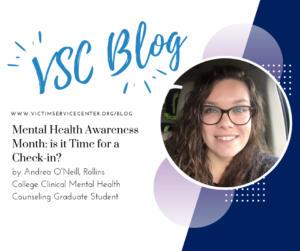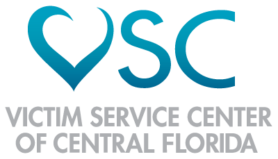
by: Andrea O’Neill, Rollins College Clinical Mental Health Counseling Graduate Student
As April showers give way to May flowers, we begin to celebrate Mental Health Awareness Month. This is a great opportunity to take the time to evaluate where you are with your inner self. A mental health check-in can be done at any time and can help you keep up with your overall health and well-being.
A mental health check-in is intentionally taking the time to process your mental health and see how you are processing and functioning. Sometimes we can go through life without processing how we are feeling or doing, and so a check-in on your mental health can be helpful–particularly for those who have survived a traumatic event. For those who have survived a traumatic event, there are certain times when it is especially helpful to stop and do a mental health check-in. The anniversary of the event and around the holidays can be difficult for survivors. Life milestones such as graduations, weddings, or the birth of a child can also bring about emotions thought long past. Times of transition can also be particularly stressful. These transitions can include a new job or moving to a new location. Basically, anytime when you are experiencing higher than usual amounts of stress is a good time to do a mental check-in, and check-in with your support system. Becoming aware that these times could be triggering is the first step in taking care of yourself. You don’t have to be the survivor of a traumatic event for these times to be stressful, but a survivor may find them even more difficult to process.
Times of stress are also a good time to schedule an appointment with a mental health counselor. A check-in session with your counselor can help you process emotions or reactions that have resurfaced. Your counselor can help you understand what brought these reactions back to the surface and figure out what is needed to cope with them.
If you’ve never been to counseling then Mental Health Awareness Month is the perfect time to try! Making an appointment is easy and you can share as much or as little as you feel comfortable with. If counseling is just not what you want then you can still take care of your mental health in other ways. It’s all about taking care of you in the best way you can. If spending time with positive people or journaling your feelings is more your speed, then go for it! Do whatever works for you that is healthy and healing.
Here are some don’ts for dealing with times of stress:
- DON’T isolate yourself. While having time alone can be calming, isolating yourself in times of stress can make things worse. Even if it feels uncomfortable, reaching out to a caring individual can make a world of difference.
- DON’T neglect your self-care. Self-care is so important and it’s not all spa trips and shopping sprees. Sometimes it’s showering when you don’t feel like it and feeding yourself something healthy.
- DON’T BLAME YOURSELF. When life stresses becomes overwhelming for us, we can begin to feel like there is something inherently wrong with us. Why is no one else struggling like I am? There is nothing wrong with you! You are having a hard time and that’s ok. Everyone struggles and they all handle it differently.
The most important thing to remember is that you are worthy of being taken care of. It is completely normal for unresolved issues to resurface in times of stress. Taking the time to assess your internal state and treat yourself the same way you would with a physical ailment is necessary and important! Just like if you had the flu, go to a medical professional, seek treatment, rest, and baby yourself for a few days. Here is a list of some helpful resources:
VSC Blog: How to Manage Triggers in a World that is Waking Up
https://victimservicecenter.org/how-to-manage-triggers-in-world-that-is-waking-up/
VSC Blog: Holistic Healing: How Mindfulness Can Help In Your Healing Journey
https://victimservicecenter.org/blog-holistic-healing-mindfulness/
Remember that VSC is always here for individuals who have experienced a traumatic event and would like to see a confidential and free counselor. Call VSC’s 24/7 crisis helpline (407) 500-HEAL or their office line during office hours to make your first appointment (407) 254-9415.
If you’re looking for other mental health services, check out the Mental Health Association of Central Florida’s Mental Health Connections to help you or a loved one get connected to mental health services: https://www.mhacf.org/mental-health-connections/
